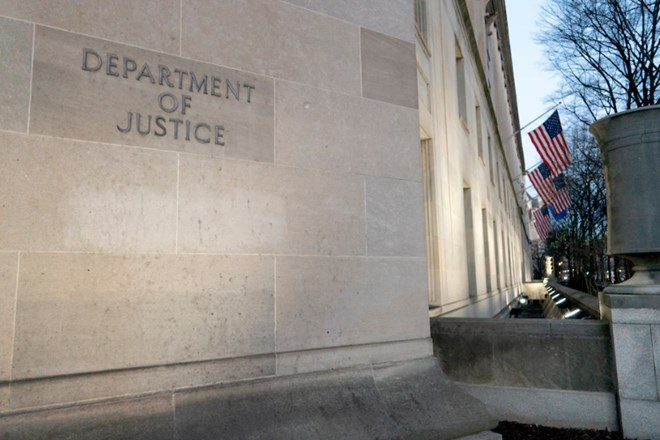
By Spencer S. Hsu
Thursday September 5, 2024
A judge had restricted key witness testimony, and prosecutors indicated they could no longer prove the case against Jeremy Schulman.

(Stefani Reynolds/AFP/Getty Images)
The Justice Department has dropped its criminal case against a Maryland attorney accused of lying and using forged documents to get control of more than $12.5 million belonging to the government of Somalia, with prosecutors saying in a court filing that legal setbacks undermined their ability to prove the allegations.
U.S. District Judge Paula Xinis granted prosecutors’ request to dismiss the 11-count indictment against Jeremy W. Schulman, 50, of Bethesda, and barred the government from reviving the charges. In a one-page motion on Friday, Justice Department trial attorney Allison L. McGuire and Assistant U.S. Attorney David I. Salem said they could not move forward “in light of, among other reasons, the Government’s assessment of pretrial evidentiary rulings in this case.”
The case, filed in December 2020, had been the subject of intense legal fighting over what evidence jurors could ultimately hear, and the judge recently imposed limits on the testimony of several key witnesses, court records show. Schulman’s defense attorneys had also alleged prosecutors acted inappropriately, soliciting false testimony and withholding evidence from grand jurors that might be helpful to Schulman, though the Justice Department had disputed the claims of intentional misconduct. A judge had not ruled on that question.
In a statement, Schulman maintained his innocence, saying he was a trusted adviser and advocate for the Somali people who was authorized to recover government assets frozen by foreign banks during that country’s decades of civil conflict.
“I’m grateful for the diligence and good faith of Judge Xinis, who handled this case with remarkable fairness,” Schulman said in a statement Wednesday released by a spokesman. “Her evenhanded approach forced the DOJ to confront the flaws in their case, ultimately leaving them with no choice but to withdraw the charges.”
Spokesmen for the department’s criminal fraud section and Maryland U.S. attorney’s office declined on Tuesday to comment beyond court filings.
The Justice Department had accused Schulman of exploiting connections to the Somali government and fraudulently representing the war-torn country’s interests from 2009 to 2014 to enrich himself and co-conspirators, lying and presenting forged documents to financial institutions. But Schulman asserted that he acted with full authorization from the Somali government, that his actions were transparent and resulted in the restoration of the country’s $20 million gold reserve and recovery of over $9 million in cash assets to its central bank.
The charges stemmed from events after the Somali Democratic Republic collapsed in the early 1990s amid a civil war. The Central Bank of Somalia then asked banks around the world to freeze financial assets belonging to the government to prevent withdrawals of gold and currency until a stable government returned to power.
Prosecutors alleged that starting in 2009, Schulman conspired to siphon off Somalia’s assets with Ali Abdi Amalow, who had been Somalia’s central bank governor when fighting broke out in 1991. Amalow had been appointed as an adviser to the transitional Somali government in 2009, but prosecutors say Schulman inflated Amalow’s position and authority and inserted “deceptive or incorrect information” into documents to gain access to Somalia’s assets.
The United States launched the investigation after one of Amalow’s successors as central bank governor, Yussur Abrar, left the country and resigned in November 2013 after only seven weeks in the post. Abrar alleged she faced pressure to authorize improper deals, including one with Schulman, that put “frozen assets at risk” and opened “the door to corruption.”
The case relied in part on a key cooperating witness, Abdiaziz Hassan Amalo, Ali Abdi Amalow’s nephew, who first contacted Schulman for his uncle. But after a June hearing, Xinis granted a defense motion to bar Amalo from testifying that his uncle was no longer Somalia’s central banker at the time of the alleged conspiracy — a key fact that would help support the case that Schulman was lying about Amalow’s lawful access to funds. Xinis said the nephew lacked sufficient personal knowledge to make that claim, and that it was not clear to her who was the central banker at the time, according to court records.
Xinis also barred Abrar from testifying that she felt shaken down or threatened by Schulman’s hiring to direct money to certain Somali officials. And the judge limited testimony from a lawyer for a currency printer who prosecutors argued put Schulman on notice that his claims about Amalow were incorrect and that certain documents were forged, according to court records.
“The government had no path to victory,” Schulman attorneys Paul W. Butler and Stanley E. Woodward Jr., said. “It was clear to Judge Xinis that the evidence to support the charges against Mr. Schulman simply didn’t exist,” Butler said.
Schulman’s statement Wednesday said that his legal team had filed a motion — the substance of which is largely redacted — laying out evidence of “serious prosecutorial misconduct” and was poised to file a second misconduct motion before Friday’s developments. The papers “depicted a prosecution team relying on coerced false witness testimony, suppressing exculpatory evidence, and deliberately omitting key testimony from senior Somali government officials who had conferred authority on Schulman,” the legal team’s statement said.
Xinis had not ruled on the motion before the case was dismissed. In court filings rejecting defense claims, the Justice Department fired back at what it called Schulman’s “many meritless accusations that the Government solicited perjury and knowingly misled the grand jury.”
The Justice Department took seriously Xinis’s earlier findings “faulting the Government for what it viewed to be investigative lapses,” prosecutors wrote, but Schulman’s allegation of a pattern of misconduct, “including repeatedly suborning perjury, far exceeds those issues.” The Supreme Court, they noted, has held that prosecutors are not required to present exonerating evidence to grand jurors when seeking charges.